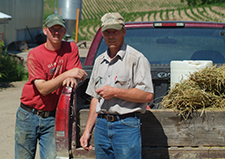 My fiancé and I find ourselves having important and sometimes difficult conversations with growing frequency. While some of those talks center around paint swatches and my swollen wedding boards on Pinterest, the most difficult conversations discuss the big decisions we're going to need to make as we begin to take over his family's dairy farm.
My fiancé and I find ourselves having important and sometimes difficult conversations with growing frequency. While some of those talks center around paint swatches and my swollen wedding boards on Pinterest, the most difficult conversations discuss the big decisions we're going to need to make as we begin to take over his family's dairy farm. A family that takes initiative and is motivated to move forward will achieve a more successful farm transition, and a major component of that success is effective communication. A farm succession planning guide, AgVentures Farm Business Arrangements and Farm Transfers, is available through the University of Wisconsin's Center for Dairy Profitability and dives right into the nuts and bolts of successful communication in its first chapter.
The guide outlines six key characteristics of effective communication, which are:
1. Make your message clear. It takes the pressure off when you know that you have made your intentions as easy to understand as possible. Clarifying your intentions also lowers the risk of miscommunication, which is a leading cause of conflict.
2. Use various means of communication. While face-to-face conversations are the most common, other channels of interaction include letters, over the phone, texting and e-mail. Do not underestimate the power of nonverbal communication (facial gestures and body language), which cannot be faked. In addition, keep in mind that serious conversations should not be had through channels such as texting and e-mail.
3. Remove communication barriers. If you're in an environment with lots of noise such as animals, machinery or children, find a place that is quieter so both parties can easily understand each other. Also, use common language that you can both understand.
4. Use feedback techniques. Be mindful of how those on the receiving end of your message may react. One of the best ways to see how your message was interpreted is to (politely) ask the receiver to summarize or restate what you just said.
5. Be an effective listener. Show genuine interest in what the other person is trying to say, and make it known that you are willing to listen to anything and everything they want to make known…even things you may not want to hear.
6. Listen for accuracy, empathy and joint contribution. Do they sincerely care and empathize with your concerns, and are they willing to work with you to make a project or plan succeed?
The road to a successful farm transition isn't always smooth, and poor communication doesn't make it any better. With some forethought, a clear conscience, and a kind heart the process can be a little less rough.

The author is a junior at the University of Wisconsin-River Falls, majoring in agricultural marketing communications. She will serve as the 27th Hoard's Dairyman editorial intern this summer.







